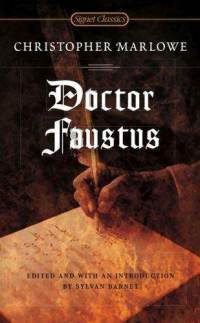Doctor Faustus By Christopher Marlowe Summary and Analysis Scene 3
 SCENE 3
SCENE 3 Enter FAUSTUS to conjure.
FAUSTUS.
Now that the gloomy shadow of the earth,
Longing to view Orion's drizzling look,
Leaps from th' antartic world unto the sky,
And dims the welkin with her pitchy breath,
Faustus, begin thine incantations,
And try if devils will obey thy hest,
Seeing thou hast pray'd and sacrific'd to them.
Within this circle is Jehovah's name,
Forward and backward anagrammatiz'd,
Th' abbreviated names of holy saints,
Figures of every adjunct to the heavens,
And characters of signs and erring stars,
By which the spirits are enforc'd to rise:
Then fear not, Faustus, but be resolute,
And try the uttermost magic can perform. —
Sint mihi dei Acherontis propitii! Valeat numen triplex Jehovoe!
Ignei, aerii, aquatani spiritus, salvete! Orientis princeps
Belzebub, inferni ardentis monarcha, et Demogorgon, propitiamus
vos, ut appareat et surgat Mephistophilis, quod tumeraris:
per Jehovam, Gehennam, et consecratam aquam quam nunc spargo,
signumque crucis quod nunc facio, et per vota nostra, ipse nunc
surgat nobis dicatus Mephistophilis!
Enter MEPHISTOPHILIS.
I charge thee to return, and change thy shape;
Thou art too ugly to attend on me:
Go, and return an old Franciscan friar;
That holy shape becomes a devil best.
[Exit MEPHISTOPHILIS.]
I see there's virtue in my heavenly words:
Who would not be proficient in this art?
How pliant is this Mephistophilis,
Full of obedience and humility!
Such is the force of magic and my spells:
No, Faustus, thou art conjuror laureat,
That canst command great Mephistophilis:
Quin regis Mephistophilis fratris imagine.
Re-enter MEPHISTOPHILIS like a Franciscan friar.
MEPHISTOPHILIS.
Now, Faustus, what wouldst thou have me do?
FAUSTUS.
I charge thee wait upon me whilst I live,
To do whatever Faustus shall command,
Be it to make the moon drop from her sphere,
Or the ocean to overwhelm the world.
MEPHISTOPHILIS.
I am a servant to great Lucifer,
And may not follow thee without his leave:
No more than he commands must we perform.
FAUSTUS.
Did not he charge thee to appear to me?
MEPHISTOPHILIS.
No, I came hither of mine own accord.
FAUSTUS.
Did not my conjuring speeches raise thee? speak.
MEPHISTOPHILIS.
That was the cause, but yet per accidens;
For, when we hear one rack the name of God,
Abjure the Scriptures and his Saviour Christ,
We fly, in hope to get his glorious soul;
Nor will we come, unless he use such means
Whereby he is in danger to be damn'd.
Therefore the shortest cut for conjuring
Is stoutly to abjure the Trinity,
And pray devoutly to the prince of hell.
FAUSTUS.
So Faustus hath
Already done; and holds this principle,
There is no chief but only Belzebub;
To whom Faustus doth dedicate himself.
This word "damnation" terrifies not him,
For he confounds hell in Elysium:
His ghost be with the old philosophers!
But, leaving these vain trifles of men's souls,
Tell me what is that Lucifer thy lord?
MEPHISTOPHILIS.
Arch-regent and commander of all spirits.
FAUSTUS.
Was not that Lucifer an angel once?
MEPHISTOPHILIS.
Yes, Faustus, and most dearly lov'd of God.
FAUSTUS.
How comes it, then, that he is prince of devils?
MEPHISTOPHILIS.
O, by aspiring pride and insolence;
For which God threw him from the face of heaven.
FAUSTUS.
And what are you that live with Lucifer?
MEPHISTOPHILIS.
Unhappy spirits that fell with Lucifer,
Conspir'd against our God with Lucifer,
And are for ever damn'd with Lucifer.
FAUSTUS.
Where are you damn'd?
MEPHISTOPHILIS.
In hell.
FAUSTUS.
How comes it, then, that thou art out of hell?
MEPHISTOPHILIS.
Why, this is hell, nor am I out of it:
Think'st thou that I, who saw the face of God,
And tasted the eternal joys of heaven,
Am not tormented with ten thousand hells,
In being depriv'd of everlasting bliss?
O, Faustus, leave these frivolous demands,
Which strike a terror to my fainting soul!
FAUSTUS.
What, is great Mephistophilis so passionate
For being deprived of the joys of heaven?
Learn thou of Faustus manly fortitude,
And scorn those joys thou never shalt possess.
Go bear these tidings to great Lucifer:
Seeing Faustus hath incurr'd eternal death
By desperate thoughts against Jove's deity,
Say, he surrenders up to him his soul,
So he will spare him four and twenty years,
Letting him live in all voluptuousness;
Having thee ever to attend on me,
To give me whatsoever I shall ask,
To tell me whatsoever I demand,
To slay mine enemies, and aid my friends,
And always be obedient to my will.
Go and return to mighty Lucifer,
And meet me in my study at midnight,
And then resolve me of thy master's mind.
MEPHISTOPHILIS.
I will, Faustus.
[Exit.]
FAUSTUS.
Had I as many souls as there be stars,
I'd give them all for Mephistophilis.
By him I'll be great emperor of the world,
And make a bridge thorough the moving air,
To pass the ocean with a band of men;
I'll join the hills that bind the Afric shore,
And make that country continent to Spain,
And both contributory to my crown:
The Emperor shall not live but by my leave,
Nor any potentate of Germany.
Now that I have obtain'd what I desir'd,
I'll live in speculation of this art,
Till Mephistophilis return again.
[Exit.]











